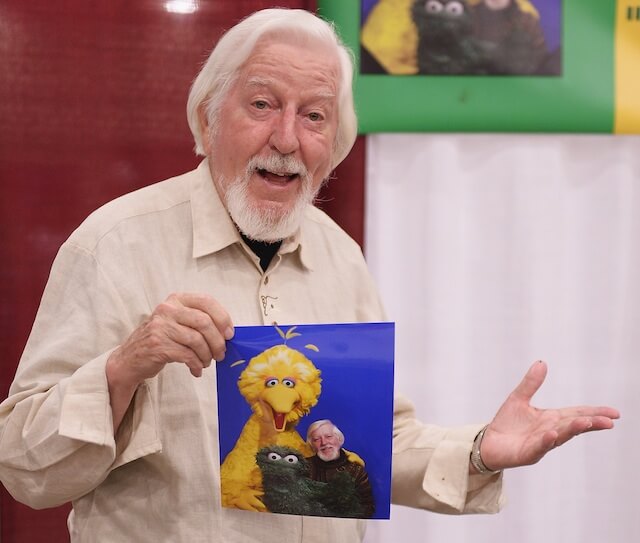Since 1969, Big Bird and Oscar the Grouch have all been voiced and, for the most part, controlled by the same man: Caroll Spinney. The puppeteer has for the most part stayed off-camera, OK with a few generations of “Sesame Street” viewers not knowing the man who was an integral part of their childhood. That changes with “I Am Big Bird: The Caroll Spinney Story,” a new doc that covers his life and work, and has since made him recognizable on the street. Not that Spinney — as warm and funny as one would expect — minds the fame. What convinced you to step into the limelight after all these years? People love to ask me why I decided at this time to do this. The answer is [directors Dave LaMattina and Chad N. Walker] were the first people to approach me. I didn’t think I’d lived a life important enough to make one. I’m so proud to be so humble, ha ha ha. That was a little joke. It’s also a film about the evolving state of “Sesame Street.”
There have been a number of changes to suit the people of America. If you look at how the world changed from 1900 to 1945 — and we’ve spanned that amount of time since we started the show — there were a lot of changes in America. The show has always tried to reflect what America is as much as possible. I was actually just watching the first ever episode, from 1969…
It looked real amateur hour, didn’t it?
Well, Big Bird, for one thing, looks significantly different.
I was kind of disappointed how he looked. He looked kind of raggedy. The feathers were just plastered on, and he didn’t have any feathers above his eyeballs. It didn’t look like he had any IQ whatsoever. And he wasn’t a kid. I rarely disagreed with Jim Henson, because Jim was an incredible genius. He always wanted to build a silly, goofy puppet of a bird. My first voice for him was [slips into a dumb person voice] “Oh, you’re a dumb bird, ha ha” — like a local yokel. But eventually some of the writers wrote a thing where Big Bird sees these children going into a day care center, and they wanted him to go with them. I thought I should play Big Bird like he happens to be a big kid. And they went along with it. I don’t think if he remained a yokel he’d even be on the show today. You’ve done a rare thing for a performer, which is play the same characters for 45 years. What has kept you interested in Big Bird for that long?
The difference between Big Bird and the other muppets is Big Bird got to be very sensitive and complex. He’s not just into cookies or something. I’m not putting [Cookie Monster] down.
He’s also, at 8’2”, probably still the tallest character on television.
It’s kind of satisfying for me because I was the smallest boy in the class in high school. That wasn’t so much fun. When I joined the Air Force when I was 19, I grew three inches during basic training. I guess it was all the marching. Your voice for him still sounds the same at your age, which is incredible, considering how the voice tends to erode over the years.
I’m awfully lucky. My father lived to be 91. He looked like an old man but sounded like he always did. That seems to be working for me too.
Does Oscar’s rougher voice grate on your vocal chords?
Actually Oscar’s voice doesn’t bother me in any way. I even had a very soar throat, the kind that when you swallow it feels like you’re twisting a knife. Even then Oscar’s voice wasn’t any strain at all. Not like Cookie Monster. I remember Frank Oz used to do Cookie Monster, and he had to learn not to rehearse as Cookie Monster’s voice because it was really rough on his vocal chords. You actually went viral recently when you made a spoof of “Birdman” about you being followed around by Big Bird. We did that just a few weeks ago. It was 19 degrees with 30 mile per hour winds. I thought were going to die making that thing. But we were only out there briefly.
You’ve been very clear that you have zero interest in retiring any time soon. What’s your secret to still controlling that massive puppet, which has to be exhausting?
I don’t do it all the time now. My stand-in has been waiting for 17, 18 years, and he now often does it. I do the voice, because I think that’s the heart and soul of it. I can put my feelings in the readings. I love the job, but I’m glad to have some relief in the playing of it, because it is pretty physically draining. It’s always amazing when people continue to work well into old age.
I have a great admiration for the Spanish puppeteer Senor Wences. He performed on the last day of his life. He did a job in Madrid, which was where he lived, and he did it the same as usual. Best ventriloquism I ever heard in my life. And he completed the show, had dinner, went to bed, and that was it. He was 103. I’d love to emulate him. There was Manoel de Oliveira, a Portuguese filmmaker who recently died at 106. He was still directing close to his death.
Michelangelo in the 1500s, he worked till he died. He was 89 years old at a time when the life expectancy was 38, 39 years old. Other Italian painters, they all lived to be way into their 80s at a time when a lot of people kicked off far earlier, because there was poor medicine. The best doctor was usually the barber. I think keeping working is good for you. My father would have lived a lot longer had he gotten up and walked more. Instead he was watching bowling shows. Do you have an idea of when you might stop?
I want to do at least 50 years — 55 if I can. That would make me 90. But I don’t think I can do that.
[It’s at this point Debra Spinney, his wife, sitting next to him and sometimes helping him fill in names and details he can’t instantly grasp, chimes in]: You can.
Big Bird speaks! Talking with pupeteer Caroll Spinney

Getty Images
Follow Matt Prigge on Twitter @mattprigge


















